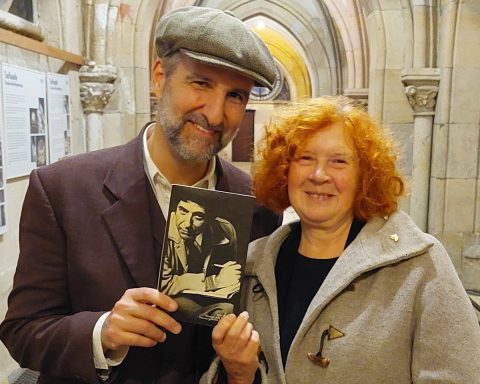As I guess I could have been called a bit of a nomad myself from the age of fourteen until I found my home in Leipzig in 2000, I have been fascinated by the depiction of that kind of lifestyle, especially the Romani people or Gypsies. In part it could be down to my romanticized perception of traveling and living from the land.
Without a doubt, celluloid in its representation of gypsies has had pockets of romanticism, namely Johnny Depp in Chocolat, within the good, the bad and the ugly. But in this review of sorts, I wanna take a look at perhaps a less romantic and more nuanced ongoing depiction, that of the Irish Gypsies, and the so-called Pikies. The phrase was coined, and I guess came to prominence, in Guy Ritchie‘s Snatch., but for more chiaroscuro and subtle hue, I wanna take a look at their role in the celluloid story of Peaky Blinders.
The Peaky Blinders were a real gang that grew up in the aftermath of the First World War in the industrial heartland of Birmingham. Documentaries, documents, first-hand accounts and stories can be found of these local Midland characters.
However, on screen, you can find them in the cult BBC series of the same name. It is not so violent, gruesome or brutal as the Godfather films, Scum or Eastern Promises. Like in these movies, it follows a gang and has similar elements of macho bravado, power struggles, honour, crime, comradeship and fealty. However, for me the main theme is family. Two of these main families are Irish Gypsies, the Shelbys and the Lees. They could not be as far apart as strong tea and whisky. The Shelbys I guess you could say are two-headed, in that they are run by Tommy and Polly. Protagonist Tommy, played by Cillian Murphy, is the brother who pulled the family together after the First World War and their father’s abandonment. However, the real power behind the family comes from Aunt Polly. An all-rounder in the business, she does ledger and bookkeeping, and her back story is about her kids, whether taken by social services or two sons returned from and torn apart by the ravages of war. It is nice to see such strong female characters in this series, not only in Polly, played by the critically appraised Scottish stage actress Helen McCrory, but also Grace (Annabelle Wallis), the bittersweet love interest of Tommy.
The two brothers of our leading man are the pretty boy John and the violently troubled soul Arthur; however, again, it is their female sibling who is truly the strong one. Defying her family through her love and commitment to the Bolshevik and union-protagonist Freddie Thorne, Ada stonewalls the familial politics. There is a great twist that adds salt and a salve to the wound of Tommy and Freddie’s relationship, but I am not going to spill the beans here.
Another strange marriage of characters involves the arranged one between John and a fair daughter of the Lees.
Where the Shelbys are a settled urbanite Gypsy family, the Lees are living-from-the-land, so-called Pikies. A gang of illegitimate horse traders and race course bookie touts. Rivals and somewhat reluctant comrades of the Shelbys, they are run by an all-powerful female figurehead. Add these families to the Italian Kimbers and the Jewish Solomons, led by Tom Hardy as Alfie, and you have a melting pot for family tension and separating and separated loyalties.
The series is one of the ilk of recent really thoughtful shows that interplay with culture and lingo.The Romani/Irish dialect by the Lees and Shelbys can be heard at intervals. There are some cliches in the show, but they barely scratch the surface of the quality. Put the family depiction up there with the cinematography, script and a soundtrack from Nick Cave/PJ Harvey, and you have the Romani depicted as a gem amongst other precious stones and coal dust. To a fair few it is a multi-layered, fascinating series; especially if, like me, you prefer it when some of the grit and spark of reality come to your small screen.
It is rare to find a show that gives a fair hearing to the Romani. And on a local note, I am interested to see the response to Papusza – Die Poetin der Roma, which is playing tonight at 7:30 at die naTo, and how it fares as a reflection of the Polish Romani.







![Wine & Paint event on 9 Nov. 2024 at Felix Restaurant, Leipzig. Photo: Florian Reime (@reime.visuals] / Wine & Paint Leipzig](https://leipglo.com/wp-content/uploads/2024/12/pixelcut-export-e1733056018933-480x384.jpeg)

